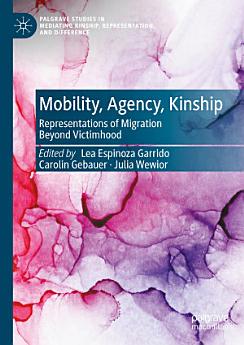Mobility, Agency, Kinship: Representations of Migration Beyond Victimhood
Lea Espinoza Garrido · Carolin Gebauer · Julia Wewior
Aug 2024 · Springer Nature
Ebook
272
Pages
reportRatings and reviews aren’t verified Learn More
About this ebook
This volume offers new perspectives on the ways in which migrants use storytelling practices and kinship formations in order to navigate and modify spaces of sovereignty, and thus to re-write narratives portraying them as helpless and passive victims. It provides one of the first investigations that assembles multidisciplinary contributions to look beyond individual acts of migrant agency and toward the entanglements of individual and collective agency, formations of kinship structures, and feelings, expressions, and representations of community and (multiple) belonging(s).
The contributions explore the interplay between agency, kinship, and migration from various fields, including sociology, psychology, philosophy, border studies, gender and queer studies, postcolonial studies, ecocriticism, film and media studies, and literary and cultural studies – with a special focus on interdisciplinary narrative theory. They address real and imagined assertions of migrant agency and kinship formations; draw on empirical research, interviews, and accounts of lived experiences; and analyze the role of narrative, media, and technologies in artistic, literary, and cinematic representations of migrant agency and kinship. By probing migrant identity discourses in different cultural and medial contexts, the contributions examine how narratives negotiate and challenge the unequal distribution of mobility, resources, and vulnerability that preconfigures many migrant lives; they also discuss narrative devices, storytelling techniques, and other representational strategies that migrants employ, as well as technologies that they draw on, to lay powerful claims on space and citizenship and to eschew established scripts of victimhood. As such, the volume addresses and embraces the tensions between vulnerability and agency that come to the fore when we try to understand the different ways in which migrants shape, and are shaped by, their (trans)local, material, economic, affective, social, cultural, and political realities.
The contributions explore the interplay between agency, kinship, and migration from various fields, including sociology, psychology, philosophy, border studies, gender and queer studies, postcolonial studies, ecocriticism, film and media studies, and literary and cultural studies – with a special focus on interdisciplinary narrative theory. They address real and imagined assertions of migrant agency and kinship formations; draw on empirical research, interviews, and accounts of lived experiences; and analyze the role of narrative, media, and technologies in artistic, literary, and cinematic representations of migrant agency and kinship. By probing migrant identity discourses in different cultural and medial contexts, the contributions examine how narratives negotiate and challenge the unequal distribution of mobility, resources, and vulnerability that preconfigures many migrant lives; they also discuss narrative devices, storytelling techniques, and other representational strategies that migrants employ, as well as technologies that they draw on, to lay powerful claims on space and citizenship and to eschew established scripts of victimhood. As such, the volume addresses and embraces the tensions between vulnerability and agency that come to the fore when we try to understand the different ways in which migrants shape, and are shaped by, their (trans)local, material, economic, affective, social, cultural, and political realities.
About the author
Lea Espinoza Garrido is a researcher and lecturer in the field of American Studies at the University of Wuppertal, Germany, where she is also co-chair of the “Narrative Research Group” of the Center for Narrative Research.
Carolin Gebauer is a postdoctoral researcher and lecturer in British Literature and Culture at the University of Wuppertal, Germany, and a board member of Wuppertal’s Center for Narrative Research.
Julia Wewior is a researcher and lecturer in the field of American Studies at the University of Wuppertal, Germany, where she is a board member of the Center for Narrative Research.
Rate this ebook
Tell us what you think.
Reading information
Smartphones and tablets
Install the Google Play Books app for Android and iPad/iPhone. It syncs automatically with your account and allows you to read online or offline wherever you are.
Laptops and computers
You can listen to audiobooks purchased on Google Play using your computer's web browser.
eReaders and other devices
To read on e-ink devices like Kobo eReaders, you'll need to download a file and transfer it to your device. Follow the detailed Help Center instructions to transfer the files to supported eReaders.





